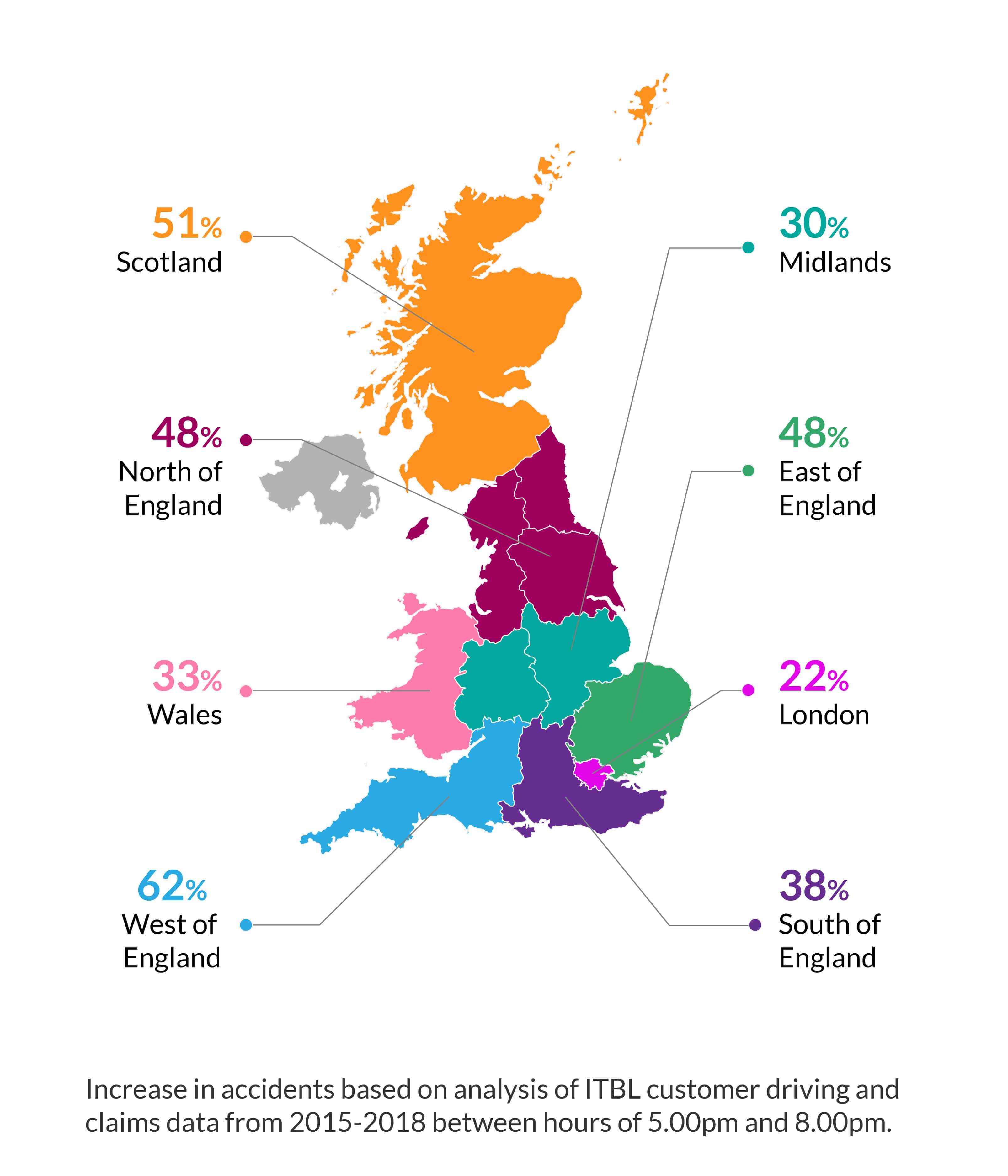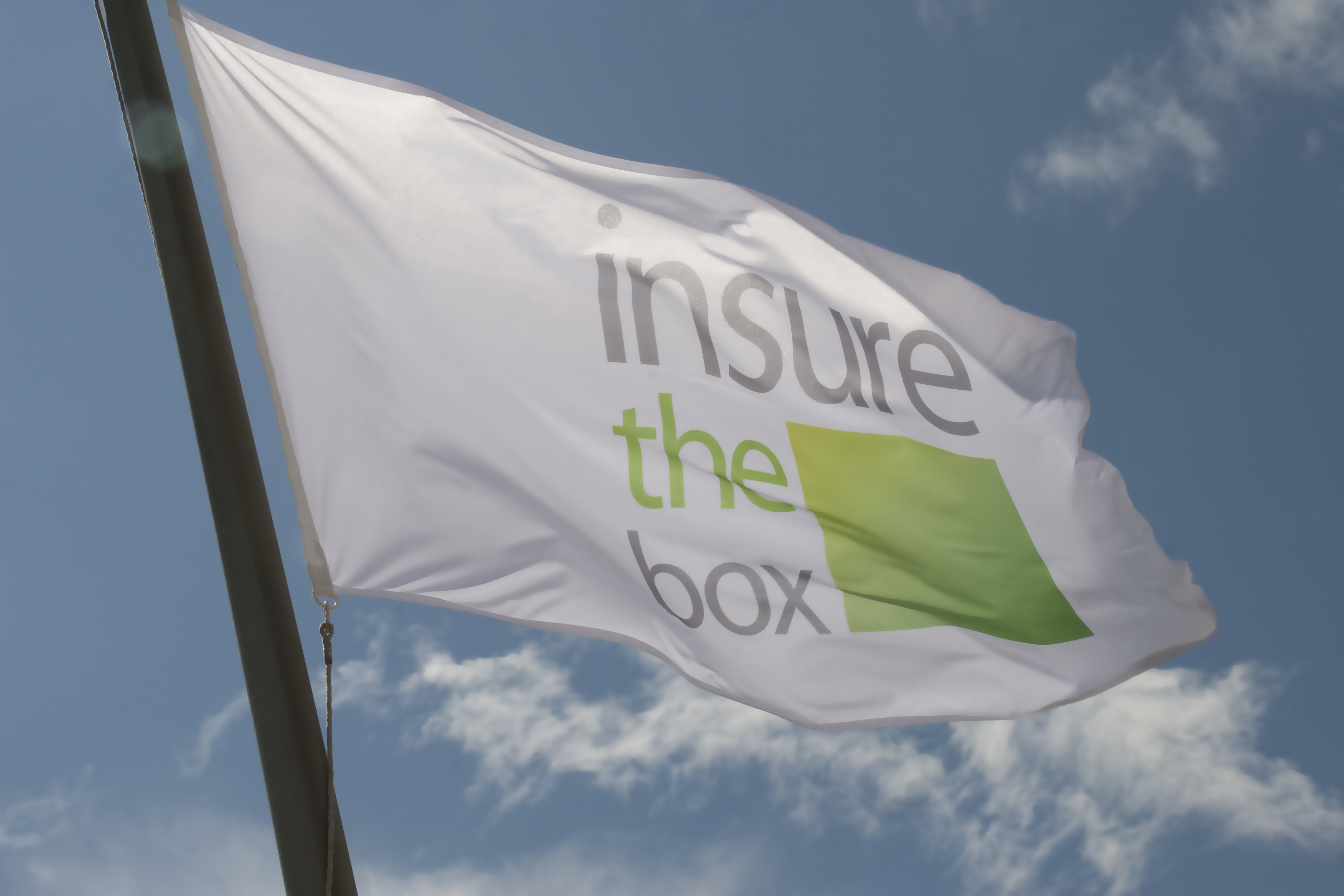insurethebox data reveals the increased risks facing road users after Clock Change
- Scotland, The West and Northern Counties see the biggest increase in risk of accidents in the evening rush hour
- Southern Counties see a 38% increase in accidents in the evening commute
- There’s also an 8% increase in accidents in the morning rush hour across the UK[1] although Wales sees a 45% decrease
The latest data from insurethebox, the UK pioneer of telematics insurance, reveals the true cost motorists pay for an extra hour in bed, with an overall 14% increase in accidents across the UK. And the loss in daylight in the evening appears to have a particularly marked impact with a 36% increase in accidents between 5.00pm and 8.00pm. In Greater London the sun sets at 5.45pm[2] on Saturday 26 October; one day later it sets at 4.43pm[3]; that’s 58 minutes less daylight in the evening. But more significant is the difference in daylight in the evening from the start of one working week to the next. The sun sets 73 minutes earlier on Monday 28 October[4] at 4.42pm compared to Monday 21 October[5] when it set at 5.55pm. The latest analysis is released ahead of this weekend’s clock change, to encourage all motorists to be mindful of the lower visibility, which is made even more hazardous as winter weather conditions set in.
The analysis of customer driving data from insurethebox shows the evening rush brings the biggest risk of accidents between the hours of 5.00pm and 8.00pm in the weeks directly following the clock change. The risk varies across the country with the North of England reporting one of the highest increases in accident rates between the months of October and November with a 48% increase in the evening and an 8% increase in the morning rush hour.
Scotland and the East of England also see a sizable increase in accident rates during the home time commute with 51% and 48% increases in incidents respectively.
Londoners are the least affected by the clock change in the evening commute compared to other UK regions with a 22% increase in accidents. The Welsh motoring community actually see a 45% decrease in accidents in the morning rush hour – perhaps aided by the lighter mornings.
Young drivers, aged 17-25, with less experience on the roads are likely to be more vulnerable – especially if they are facing their first experience of driving in wintry conditions since passing their test. Their normal drive home from work will be much darker than usual after this weekend.
Simon Rewell, Road Safety Manager at insurethebox, commented: “insurethebox data shows that accident risk increases as a direct result of the clocks going back. For many young drivers, the evenings after the clock change will be their first experience of driving in the dark, coping with different conditions like reduced visibility. Nearly 5 billion miles of driving data accumulated over nearly 10 years provides us with an extensive dataset, enabling us to spot trends and help our customers – before they need to make a claim”.

Media enquiries to:
Parm Heer//Wendy Harrison
Tel: 0208 977 9132
Email: itb@harrisonsadler.com
Notes to Editors
insurethebox
Insure The Box Limited launched in June 2010 with its first product, insurethebox, and now holds almost 5 billion miles of driving data and associated claims. As well as insurethebox and drive like a girl (another Insure The Box brand) it also administers other telematics offerings. Insurethebox is owned by Aioi Nissay Dowa Europe Limited, part of the major Japanese insurance group MS&AD Holdings, Inc. The group is taking a leading role in the development of technologies that will change the face of motor insurance and the way we view the car.
[1] Morning rush hour – between the hours of 6.00am and 9.00am.
[2] https://www.bbc.co.uk/weather/2643743
[3] https://www.bbc.co.uk/weather/2643743
[4] https://www.bbc.co.uk/weather/2643743
[5] https://www.bbc.co.uk/weather/2643743
